The parties involved in the Sea to Sky transit strike will be back at the bargaining table Wednesday, March 16, more than two weeks after talks broke down in a job action that has shut down transit services in Whistler, Pemberton and Squamish.
"Whistler Transit Ltd./Diversified Transportation and Unifor Local 114 have communicated and agreed to come back to the bargaining table on Wednesday, March 16, 2022, in a continued effort to reach a settlement that would bring employees back to work and resume transit operations for the Sea-to-Sky communities," said Pacific Western Transportation, the private company contracted by BC Transit to deliver transit in the corridor, in a statement. "Once again, we apologize for the inconvenience these ongoing negotiations have caused, we understand the impact this matter has had on the community. We are hopeful that this meeting will yield a reasonable resolution for everyone involved."
Pique has requested comment from Unifor and will update this story if and when we hear back.
Negotiations on Feb. 25, only a day after talks had resumed for the first time since the strike began on Jan. 29. The day prior, PWT had proposed a settlement offer that included a wage increase for all employees in each year of the agreement and retroactive pay increases back to 2020, as well as full benefits for all employees. Unifor did not put the offer to its membership for a vote, nor did it present a counter proposal.
The union said it was “disappointed” with PWT’s offer, contending the proposed wage increase did not cover the rising cost of inflation and the proposed benefit package “didn’t reach what we needed to see in terms of getting benefits for employees in a fair manner,” Gavin McGarrigle, Unifor’s western regional director, told Pique last month, declining to get into specifics.
The main sticking points for the union concern wages, benefits and job security, particularly in light of the high cost of living in the corridor. Unifor has continually said that drivers make anywhere from $3 to $5 less than their counterparts in Vancouver and Victoria, although PWT has pushed back on that point, noting the high variability in wage scale depending on experience. PWT has also taken issue with the union’s claims that 38 per cent of the bargaining unit are currently without benefits. Although it wouldn’t say what percentage of employees aren’t currently covered, PWT told Pique it offers a group RRSP pension plan and full extended health and disability benefits to all year-round, unionized employees, in addition to a “good portion” of seasonal staff.
Unifor has consistently called for wage parity with transit workers in the Lower Mainland, and with a vote last week to ratify a one-year contract extension for workers in Vancouver that included a three-per-cent wage hike for all operators and a five-per-cent hike for skilled tradespeople, the gap has been widened even further.
“The settlement has gotten farther away because this employer will just not acknowledge that this is a very tough market to hire operators, to hire skilled trades, and when you’re talking about regional transit, finding a roadmap to get some parity of conditions between here and just down the road is not an unreasonable request,” McGarrigle said in an interview last week.
Now 46 days into the strike, the parties have spent only a fraction of the job action at the bargaining table, and, as Pique , neither side has formally met with mediator Dave Schaub since Jan. 11. Schaub was first brought in by B.C.'s Labour Relation Board in September. Provincial labour minister Harry Bains also put pressure on both sides behind the scenes to get back to bargaining, and letters from both Whistler and 麻豆社国产chambers of commerce laid out how the ongoing strike is hindering local businesses.
"At best, employees and workers have been forced to spend hard-earned hourly wages on expensive taxi or ride-share fares to get to their places of work. Some are staying home from shifts, resulting in lost wages and operational challenges for employers," wrote Whistler Chamber of Commerce CEO Melissa Pace in a March 11 letter addressed to Unifor national president Jerry Dias and PWT director of operations Steve Antil. "And at worst, many people are walking to and from work along unsafe trails, roads and a busy highway with poor visibility in rainy, snowy and nighttime conditions."
The letter also highlighted the urgency needed in getting the parties back to the table in time for one of Whistler's busiest seasons, March break, "where we expect significantly increased visitation and pressure on businesses and employees to provide service for their very survival and economic recovery," Pace went on. "Alternative means of transportation will be even more difficult to come by and our community will be at its greatest risk since the transit strike began."



